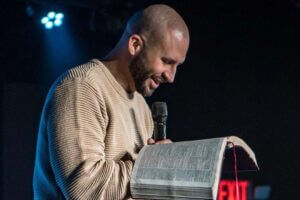A leading British Pentecostal is calling Christians to deepen their commitment to the poor by challenging world governments to cut poverty in half by 2015.
Joel Edwards, who recently was named international director of Micah Challenge, said that although poverty may never be eradicated, Christians have a responsibility “to bring not only optimism but hope into fairly difficult situations.”
“There is no doubt about it. There is the capacity and ability to do something positive and definitive about the issue of human poverty,” Edwards said. “If the Christian community globally could begin to reach into its soul and respond to the challenge of the poor then we can actually do something which makes a difference.”
Before his appointment to Micah Challenge, a global movement of Christians lobbying their governments to cut extreme poverty in half in the next seven years, Edwards spent nearly a decade as chief of the Evangelical Alliance (EA). He was the first black general director of the organization, which unites evangelical Christians across the United Kingdom.
Since he stepped down from that post in September, Edwards has been urging Christians to return to Scripture and boldly proclaim Christ to affect change in an increasingly pluralistic culture. It is a message he puts into practice.
In 2008, he joined former British Prime Minister Tony Blair’s Faith Foundation, which promotes respect and understanding about the world’s major religions. Previously, he was appointed to the U.K.’s recently launched Equality and Human Rights Commission.
The assignment made him the focus of criticism from gay activists and secularists who said Edwards’ belief in traditional Christian values—along with his biblical stance on homosexuality—would undermine the commission’s goal to promote “a society built on fairness and respect.”
He admits that he was surprised at the appointment to the “one-stop shop for human rights,” as he calls it. But he said it is important for the commission to include evangelicals’ viewpoints in its discussions.
“If this is truly a democracy, then the perspectives of Christian people need to be heard, and our values cannot be dismissed out of hand,” Edwards said. “If we are to be dismissed simply because we have a values system that [goes against the tide of the culture], that is not democracy.”
Edwards, who details his views in a recent book, An Agenda for Change, said his own personal journey has been one of crossing cultural borders, dealing with diversity and coping with “daily culture shock” since he arrived in the U.K. from Kingston, Jamaica, at the tender age of 8.
He was an officer with the Inner London Probation Service for 14 years before serving as a pastor in the New Testament Church of God for 10 years. In 1988 he became general secretary of the African and Caribbean Evangelical Alliance and four years later was named U.K. director of the EA. He became general director of the organization in 1997.
Through the course of his 20 years with the EA, Edwards has been involved in the Metropolitan Police Independent Advisory Group and an advisory group to Her Majesty’s Prison Service. In addition, Edwards is an honorary Canon of St. Paul’s Cathedral—one of the greatest landmarks in the British capital—and has an honorary doctorate from the University of St. Andrews, a historic institution in Scotland.
“Joel is an evangelical statesman who’s made a significant contribution to the witness of the church in this land,” said Mike Talbot, chairman of the EA’s board. “He is respected across the Christian community—and beyond.”
Katei Kirby of the African and Caribbean Evangelical Alliance said Edwards “has played a significant part in uniting and engaging the diversity of evangelicals in the U.K.”
Edwards said he has seen “a more thought-through and intelligent evangelism emerging across the U.K.” in the last 20 years. He noted that the “charismatic wing of the church has underpinned evangelical growth worldwide.”
Charismatic Christianity has extended beyond evangelicalism, too, Edwards noted, and influenced every tradition including Catholicism. “It has lowered the drawbridge,” he said. “Walls have come down.”
Edwards included a section on charismatic spirituality in An Agenda for Change, writing that miracles are still a key component of the credibility of Christ. “What made Christ credible in the upper room explosion had as much to do with miracles as it had to do with Peter’s clear explanation about them,” he wrote.—Clive Price in London
See an error in this article?
To contact us or to submit an article





















